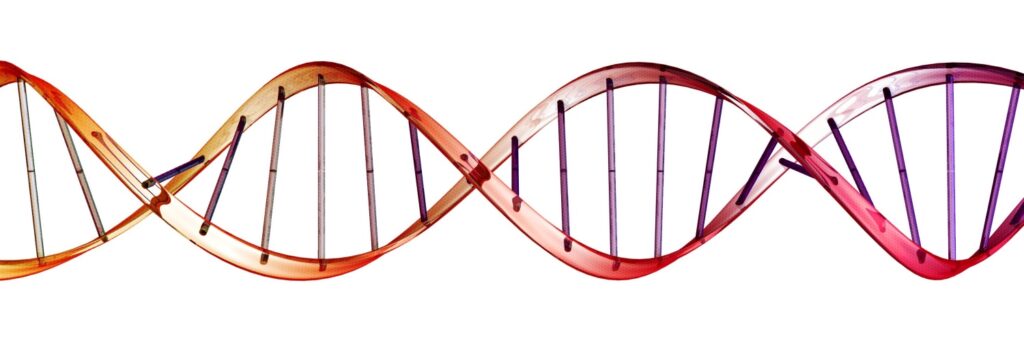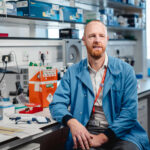Molecular Tumour Board

What is a MTB?
Molecular Tumour Boards (MTBs) are a specific type of multi-disciplinary tumour board meeting in which anonymized patient cases are discussed based on the patient’s clinical information and genetic sequencing reports.
What is genetic sequencing and what role does it have to play in cancer care?
Next-generation sequencing (NGS) is a type of genetic test that is used to study the DNA sequences of cancer cells. A DNA profile of the tumour cells is created which describes mutations or variations found in the genes of cancer cells. This helps us to understand the pathology of the disease. NGS tests generate a lot of data about mutations and genetic variations found within the DNA of cancer cells. As a result of NGS testing the area of cancer genetics is growing rapidly and clinicians are faced with the challenge of keeping up to date with the interpretation and clinical significance of these test results.
Listen to Dr Dearbhaile Collins discuss the expanding role of genomic medicine in this video from RCPI.
- Why are MTBs important?
NGS testing is becoming increasingly utilised in clinical practice in Ireland and MTBs are being used globally to provide a forum for doctors to discuss their patient’s cancer genomic findings. MTBs are a cross institutional, educational, virtual multi-disciplinary meeting to help oncologists and haematologists interpret and discuss NGS test results.
Experts ranging across molecular genetics, oncology, haematology and pathology and highly experienced in cancer genetic profiling, review patient NGS findings. During a MTB the implications of the findings and any potential targeted therapies that may be available for treatment are discussed. In this way the MTB acts as a clinical decision support system for doctors resulting in improved quality of care.
The discussion of a patient’s case at the MTB is a step important step in personalised patient care. It provides the treating doctor with a valuable resource to collaborate, self-educate and communicate with other healthcare providers in a multidisciplinary setting.
About the Irish MTB programme
The Irish MTB program was established as a pilot project by Roche in November 2020. Cancer Trials Ireland took over the operations of the MTB program in 2022 and has established the MTB as an extremely valuable clinical and educational resource for healthcare workers. By fostering collaboration on cancer treatment decisions among Irish clinicians with support of national and international experts from the medical and scientific community, the MTB is driving the transition towards precision oncology and personalised healthcare.
The MTB is now an independently run under the governance of Cancer Trials Ireland and supported through philanthropic funding from Sarah Jennifer Knott Foundation Charity.
To learn more, hear Dr Dearbhaile Collins describe the remit of the Irish Molecular Tumour Board in this video, or listen to our MTB podcast episode.
From November 2020 to June 2024, the educational MTB in Ireland has created the following footprint
41
MTBs conducted
98
Patient cases discussed
900
Cumulative participants
18
Participating institutions
3
Educational Webinars from leading experts
Our vision is to change the way cancer patients in Ireland are treated building on a Molecular Tumour Board
Focus on personalised & precision oncology
Direct patient benefits.
Educational remit of the MTB
Click here for educational webinars featuring leading experts.
EMTBN
Part of the European Molecular Tumour Board Network providing consensus on MTBs and adding to real-world data through European registry development.
Research
CUPan – development of a registry for rare cancers; equitable access to NGS testing

Dr Dearbhaile Collins
MTB Clinical Lead
Dearbhaile Collins is the clinical lead for the MTB programme. She is a medical oncologist working in Cork University Hospital with speciality interest in lung cancer and gynaecological malignancies. She has both a PhD in translational oncology and a MA in Medical Ethics and Law. She is Clinical Director of Cancer Services, Cork University Hospital and Co-Chair of the Cancer Trials Ireland Gynaecology DSSG.
“I am honoured to chair the MTB which will help support personalised cancer care in Ireland. It is a tremendously valuable initiative which will have direct patient benefits in addition to educational and research advantages”.
Engage with the Irish MTB programme (for clinicians)
The MTB currently operates meetings for both solid tumour and haematology-oncology (adult and AYA) case reviews.
Solid tumour MTBs are held on the last Tuesday of every month from 4-5pm.
Haematology-Oncology MTBs are held on the third Wednesday every second month from 5-6pm.
All MTB meetings are accredited with CPD points awarded by the Royal College of Physicians Ireland in recognition of the high educational value of the meetings and the important role they have to play in precision oncology in Ireland
The treating clinician shares anonymised patient information in a structured format to the MTB operation team one week prior to the meeting. This information which includes key questions are submitted to the expert panel to allow proper preparation prior to the MTB session.
All healthcare professionals working in cancer care are welcome to join the educational MTB.
For further information about the MTB or to submit a case or to register for a meeting email: mtb@cancertrials.ie
Structure of a Patient Case Template to be submitted to:
- Treating Clinician Name
- Patient History
- Molecular Genomic Insights
- Key Questions on the Patient Case
Meet the Team
Current MTB expert panel
Terri McVeigh, MB BAO BCh (Hons), PGCert. (Med. Gen.), PGDip. (Med. Sci.), MSc. (Clin. Ed.), PhD, MRCP, MRCS

- Clinical geneticist in the Royal Marsden NHS Foundation Trust, specializing in cancer genetics
- Co-Chair Oncogenomics Working Group for GeNotes, Genomics Education Programme, Health Education England
- Honorary Clinical Senior Lecturer, Institute of Cancer Research, London
- Her interests include Cancer Predisposition in Children, Adolescents and Adults (syndromic and non-syndromic), and application of genomic testing to direct cancer treatment
- Dr McVeigh also has a specialist interest in Clinical Education, and is a subject matter expert in many postgraduate medical teaching programs in the UK and Ireland
Rodrigo Dienstmann, M.D., PhD, MBA

- Principal Investigator of the Oncology Data Science Group of the Vall d’Hebron Institute of Oncology (VHIO) in Barcelona, Spain
- Medical Director of Oncoclínicas Precision Medicine, São Paulo, Brazil
- Editor in chief ESMO Real-World Data and Digital Oncology
- His research interests include: (i) integration of clinical and translational research with genomics for precision cancer therapy; (ii) clinical-molecular databases of matched targeted agents and standardized reports of next-generation sequencing tests; (iii) collaborative research in cancer genomics/computational oncology and its clinical implications
Stephen Finn, MB BAO BCh, FDS, PhD, FRCPath, FFPATH

- Associate Professor, Consultant Pathologist and Principal Investigator at The University of Dublin, Trinity College and at St. James’s Hospital Dublin
- Co-Director of the Cancer Molecular Diagnostic Laboratory at St James’s Dublin
- Dr. Stephen Finn is an academic Histopathologist with subspecialist interests in genitourinary pathology and cancer molecular diagnostics
Marie-Dominique Galibert, PharmD, PhD

- Professor at the Medical School, University of Rennes/Hospital
- Deputy Director of the Institute of Genetics and Development of Rennes (IGDR)
- Head of the Gene Expression and Oncogenesis Research Team – Labellisée Fondation ARC
- Head of the Department of Molecular Genetics and Genomics and the Co-Director of the FHU-CAMIn (Hospital University Federation – Cancer Microenvironment Innovation), Rennes University Hospital
- Her research interests include genetic, epigenetic and molecular basis of cancer development to identify new therapeutic targets and markers
 Richard Dillon, MA, PhD, MRCP, FRCPath
Richard Dillon, MA, PhD, MRCP, FRCPath
- Consultant Haematologist at Guy’s Hospital, London
- Clinical senior lecturer in cancer genetics in the Dept of Medical & Molecular Genetics at King’s College, London.
- His research interests are focussed on acute myeloid leukaemia, in particular the development of molecular diagnostics and molecularly targeted therapies. He leads on molecular MRD for the UK NCRI AML trials and is currently the chief investigator of the VICTOR and BlinAML studies,
which are investigating an MRD guided approach to therapy.
Mark Catherwood, PhD, FRCPath
- Consultant Clinical Scientist in Belfast City Hospital
- Head of Cancer Molecular Diagnostics, Regional Molecular Diagnostics Service, Belfast Health and Social Care Trust
- Honorary lecturer at Queen’s University Belfast and Ulster University
- Core member of EuroClonality, specialist working group in diagnostic, education, quality control and innovation in haemato-oncology laboratory diagnostics
- His research interests include translational cancer research particularly in the implementation of NGS for molecular diagnostics
MTB operations
Claire Bermingham, BSc (Pharmacology), MSc Molecular Medicine

Overview
Claire Bermingham is the MTB associate and looks after the operational activity for the MTB. She has a background in oncology genetics with a previous career as a clinical scientist.
Some of the high-level publications on impact on MTBs

The Molecular Tumor Board Portal supports clinical decisions and automated reporting for precision oncology
Tamborero, David et al., Nature Cancer 3, 251-261 (2022)

The value of virtual molecular tumor boards for informed clinical decision-making
Angel, Martin et al., The Oncologist. May 2024

Quantifying the Value of the Molecular Tumor Board: Discordance Recommendation Rate and Drug Cost Avoidance
Walters, Mary K et al., JCO Precision Oncology 6, Oct 2022

Molecular tumour boards — current and future considerations for precision oncology
Tsimberidou, Apostolia M et al., Nature Reviews Clinical Oncology 20, 843-863 Oct 2023
